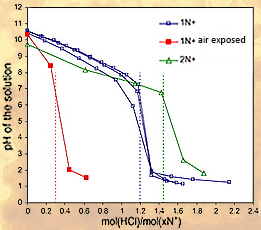Quaternary ammonium membrane materials for CO2 separation
S. Shishatskiy, J. Roman Pauls, S.P. Nunes and K.V. Peinemann
J. Membrane Sci., 359, 44-53, (2010)

Quaternary ammonium compounds are known to have extremely high affinity to carbon dioxide. Two new highly hydrophilic compounds containing one or two quaternary ammonium moieties attached to the reactive trimethoxy silane were synthesized and studied for physico-chemical and gas transport properties in the dry and wet environments. Both compounds in the form of blends with PEBAX® MH 1657 showed high CO2 solubility coefficients and high CO2/N2 (up to 1500) and CO2/H2 (up to 1350) solubility selectivity. The dry gas measurements revealed the presence of specific interaction with CO2 resulting in strong binding of the gas molecule to the polymer active center resulting in increased solubility and decreased diffusion coefficients. At low temperatures CO2 was irreversibly sorbed in the quaternary ammonium compound and was released only at temperatures higher than 60 °C. For the sample modified by co-hydrolysis with TEOS the temperature of 60 °C was found to be an additional transition point giving for H2, N2, O2 and CO2 break on the solubility coefficient Arrhenius plots. Measurements carried out with humid feed revealed up to 35-fold increase of gas permeability without CO2/N2 and CO2/H2 ideal selectivity loss compared to the dry gas measurements.